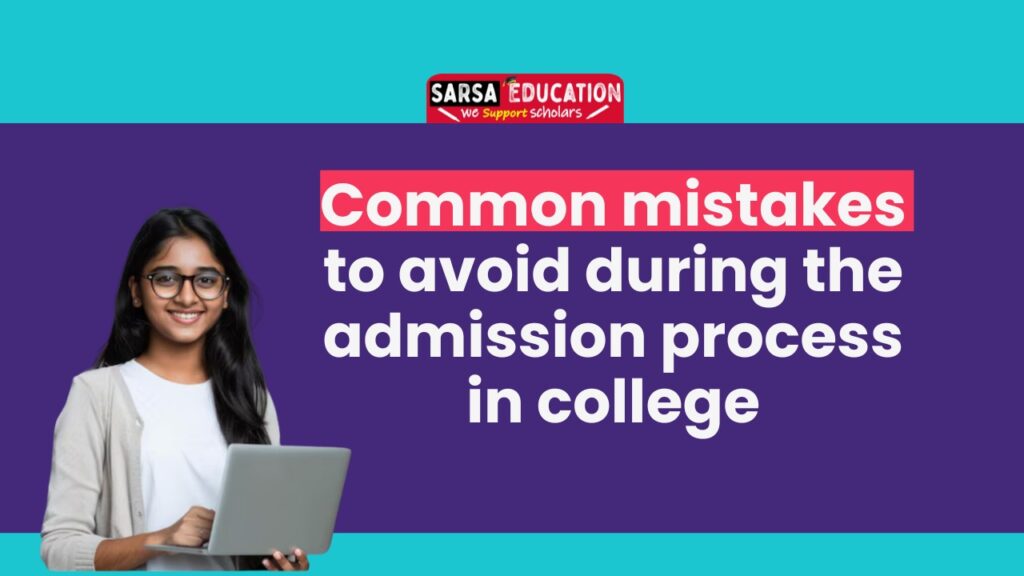Common mistakes to avoid during the admission process—sounds simple, right? But every year, thousands of students fall into the same traps that cost them time, energy, and sometimes even their dream college or course. The admission process, whether for high school, college, or a postgraduate program, is not just about filling forms. It’s about presenting your best self on paper and in person. And when done carelessly, small mistakes can lead to big consequences.
This article will walk you through the most frequent errors students make during admissions and give you practical tips to avoid them. Whether you’re applying to a local college or an international university, staying alert and informed will give you a strong edge.
Top 20 Common Mistakes to Avoid During the Admission Process:
1. Missing Deadlines
- One of the biggest and most common mistakes—highlighted in many lists of Common Mistakes to Avoid During the Admission Process—is missing application deadlines. Admission calendars are strict, and late applications are often outright rejected.
- Tip: Create a calendar or reminder system with all key dates—application deadlines, entrance exams, interviews, and document submission dates.
2. Ignoring Admission Requirements
- Each institution has its own set of admission requirements—minimum marks, entrance tests, language proficiency scores, or specific subjects—and overlooking these can be one of the Common Mistakes to Avoid During the Admission Process
- Tip: Read the admission guidelines carefully on the official website and make a checklist to ensure you meet all criteria before applying.
3. Poorly Written Personal Statement or Essay
- A personal statement is your chance to shine, but submitting a vague, copied, or boring essay is a wasted opportunity—and one of the Common Mistakes to Avoid During the Admission Process.
- Tip: Be original. Share real experiences, future goals, and why the program is right for you. Always proofread multiple times and get feedback from a teacher or mentor.
4. Using Inaccurate or False Information
- Some students try to exaggerate achievements or provide fake documents, which can lead to blacklisting or permanent disqualification—undoubtedly one of the Common Mistakes to Avoid During the Admission Process.
- Tip: Be honest. Colleges value integrity and transparency.
5. Choosing the Wrong Program or Course
- Many students pick a course based on trends, peer pressure, or parental expectations rather than their own interests or abilities—a classic example of the Common Mistakes to Avoid During the Admission Process.
- Tip: Research the syllabus, career paths, and your personal strengths before selecting a program.
6. Overlooking Financial Aid or Scholarship Opportunities
- Students often assume they won’t qualify for aid and skip applying altogether—another one of the Common Mistakes to Avoid During the Admission Process.
- Tip: Explore all financial aid options. Many institutions offer scholarships based on need, merit, or talent.
7. Not Preparing for the Interview
- Some institutions conduct interviews to assess personality and suitability, and going in unprepared can ruin your chances—making it one of the Common Mistakes to Avoid During the Admission Process.
- Tip: Practice common interview questions, dress neatly, and be confident—but not overconfident.
8. Submitting Incomplete Applications
- Missing documents like transcripts, ID proofs, or reference letters can lead to rejection—even if the rest of your application is perfect—which is one of the Common Mistakes to Avoid During the Admission Process.
- Tip: Double-check everything before submission. Use a checklist and confirm uploads are successful.
9. Not Researching the College Properly
- Choosing a college just because it’s famous or close to home is a bad idea if you haven’t researched the environment, faculty, and placement records—this is one of the Common Mistakes to Avoid During the Admission Process.
- Tip: Visit the campus (if possible), attend virtual tours, or talk to current students.
10. Applying to Too Few or Too Many Colleges
- Applying to only one or two colleges limits your chances, while applying to 20+ can lead to confusion and poor focus—both are Common Mistakes to Avoid During the Admission Process.
- Tip: Apply to a balanced number of institutions—dream, match, and safety options.
11. Weak Letters of Recommendation
- Generic or poorly written recommendation letters don’t help your application stand out—making them one of the Common Mistakes to Avoid During the Admission Process.
- Tip: Choose recommenders who know you well and can highlight specific qualities and achievements.
12. Ignoring Application Guidelines
- One of the common mistakes to avoid during the admission process is ignoring word limits, font preferences, or file format requirements, as doing so can appear careless and unprofessional.
- Tip: Follow all instructions carefully, including formatting and word limits.
13. Lack of a Backup Plan
- A common mistake to avoid during the admission process is not having an alternative plan, as not getting into your top choice can be devastating without other options.
- Tip: Have a backup college or course ready to ensure you don’t lose a year.
14. Not Taking Entrance Tests Seriously
- Among common mistakes to avoid during the admission process is relying solely on strong academic records without preparing adequately for required entrance exams, since poor test scores can outweigh your achievements.
- Tip: Practice past papers, take mock tests, and consider coaching if needed.
15. Last-Minute Application Filling
- One of the common mistakes to avoid during the admission process is leaving everything to the last minute, which can lead to increased mistakes, unnecessary stress, and potential technical problems.
- Tip: Start early and aim to submit a week or more before the deadline.
16. Lack of Proofreading
- Spelling errors, grammatical mistakes, or wrong information can make a bad impression — here are some common mistakes to avoid during the admission process.
- Tip: Review every part of your application and ask someone else to read it as well.
17. Overconfidence or Underconfidence
- Some students are overconfident and don’t put in enough effort, while others are underconfident and don’t apply to good colleges—these are common mistakes to avoid during the admission process.
- Tip: Aim for a realistic and positive mindset. Believe in yourself but be prepared.
18. Ignoring Communication from Colleges
- Failing to check emails or messages from institutions can result in missed interviews or important updates—one of the common mistakes to avoid during the admission process.
- Tip: Check your inbox regularly (including spam/junk folders) and respond promptly.
19. Not Clarifying Doubts
- If you don’t fully understand any part of the admission process, ignoring it can be risky—this is one of the common mistakes to avoid during the admission process that could cost you valuable opportunities.
- Tip: Reach out to the college’s admission office or use forums and FAQs.
20. Not Keeping Copies of Everything
- Losing track of your documents, receipts, or submitted forms is one of the common mistakes to avoid during the admission process, as it can make resolving issues difficult.
- Tip: Keep digital and physical copies of all documents and confirmations.
Important links:
- Online BBA Course, It’s cost & benefits
- Online BCA Course, It’s cost & benefits
- Online MCA Course, Its cost & benefits
- Online MBA Programs , Its Cost and Benefits
- Top Scholarships after 12th for Arts, Science & Commerce
- Top 100 Scholarships for B.Com students.
- Top Scholarship for Engineering Students
- Top 100 Scholarships for B.Sc students.
Frequently Asked Questions(FAQs):
1. What are the most common mistakes applicants make during the admission process?
Missing deadlines, submitting incomplete applications, and failing to follow instructions are among the top mistakes.
2. How important is it to meet application deadlines?
Extremely important. Late applications are often disqualified or ignored, regardless of merit.
3. Is it a mistake to apply to only one or two colleges?
Yes. Applying to a range of schools (reach, match, safety) increases your chances of acceptance and financial aid options.
4. Can poor grammar or spelling in the application hurt my chances?
Yes. Sloppy writing shows a lack of effort and professionalism, which can reflect poorly on your candidacy.
5. Should I tailor my personal statement for each college?
Yes. Using a generic essay is a common mistake. Personalizing it shows genuine interest and effort.
6. Is exaggerating or lying on the application a serious issue?
Absolutely. Any dishonesty can lead to disqualification, rescinded offers, or even expulsion later on.
7. Do I need to visit the campus before applying?
Not required, but helpful. Not visiting is fine, but failing to research the school thoroughly is a mistake.
8. How can recommendation letters go wrong?
Choosing the wrong person (e.g., someone who doesn’t know you well) or missing deadlines for submission can hurt your application.
9. Is forgetting to submit standardized test scores a common error?
Yes, especially if not sent directly from the testing agency. Check each school’s requirements carefully.
10. What if I misunderstand application requirements?
It can lead to rejection. Always double-check each school’s checklist and confirm with admissions if unsure.
11. Can applying to too many colleges be a problem?
Yes. Spreading yourself too thin may reduce the quality of each application and become overwhelming.
12. How important is it to demonstrate interest in the school?
Very. Not attending info sessions, skipping optional essays, or failing to engage may indicate low interest.
13. Is it okay to reuse essays from other schools?
Only with modifications. Reusing without adapting content is a big mistake that can make your application feel impersonal.
14. Should I include every extracurricular activity I’ve ever done?
No. Focus on quality over quantity. Listing irrelevant or brief involvements can dilute the impact.
15. What’s a common financial aid application mistake?
Missing the FAFSA or CSS Profile deadlines, or providing inaccurate financial information.
16. Is waiting until the last minute to apply a bad idea?
Yes. Last-minute applications increase the risk of technical issues, rushed writing, and errors.
17. How can I avoid submitting an incomplete application?
Use a checklist and confirm every required document is uploaded or submitted by the deadline.
18. Should I skip optional components of the application?
No. Optional essays or interviews are opportunities to stand out—skipping them is a missed chance.
19. Is asking for help during the application process considered cheating?
Not if done appropriately. Getting feedback or guidance is fine, but others should not write your essays or fabricate content.
20. Can poor communication with admissions offices hurt my application?
Yes. Unprofessional or excessive emails can reflect poorly. Always be respectful, concise, and clear.
For National/International Scholarship updates kindly join our WhatsApp channel
Follow the Sarsa Education channel on WhatsApp: https://whatsapp.com/channel/0029VaL9SgRAjPXJthnK9D0E
In case of any queries, please reach out to:
+91-9156405182 (Monday to Friday – 10:00 AM to 06:00 PM (IST))
Mock Interview Visa Questions Answers
For regular Scholarship/Fellowship/Internship updates:
Join our Telegram channel: Sarsa Education








